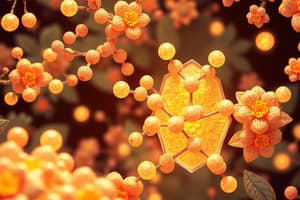Podcast
Questions and Answers
Which of the following is a disaccharide?
Which of the following is a disaccharide?
- Sucrose (correct)
- Starch
- Glucose
- Fructose
All polysaccharides are soluble in water.
All polysaccharides are soluble in water.
False (B)
What are the two main types of reactions that involve carbohydrates?
What are the two main types of reactions that involve carbohydrates?
Condensation reaction and hydrolysis
______ is the main structural component of plant cell walls.
______ is the main structural component of plant cell walls.
Match the following carbohydrates with their characteristics:
Match the following carbohydrates with their characteristics:
Flashcards
Glucose
Glucose
A simple sugar that serves as the primary energy source for most organisms.
Fructose
Fructose
A simple sugar found naturally in fruits, known for its sweet taste.
Galactose
Galactose
A simple sugar that combines with glucose to form lactose, the sugar found in milk.
Starch
Starch
Signup and view all the flashcards
Cellulose
Cellulose
Signup and view all the flashcards
Study Notes
Carbohydrates
- Carbohydrates are a group of macromolecules, made up of carbon, hydrogen, and oxygen.
- They act as a primary source of energy.
- Monosaccharides are simple sugars, like glucose, fructose, and galactose.
- Disaccharides are formed when two monosaccharides join through a condensation reaction, releasing a water molecule. Examples include sucrose, lactose, and maltose.
- Polysaccharides are complex carbohydrates formed by joining many monosaccharides. Starch, glycogen, and cellulose are examples.
- Starch is a storage polysaccharide found in plants. It is composed of amylose (linear structure) and amylopectin (branched structure), and is insoluble in water.
- Glycogen is a storage polysaccharide found in animals. It's highly branched.
- Cellulose is a structural polysaccharide found in plant cell walls. It's composed of unbranched chains of glucose.
- Condensation reaction- bonds two molecules with the loss of water.
- Hydrolysis happens when water is added to break the bonds between two molecules.
Starch
- Starch is used for energy storage in plants.
- It's a polysaccharide composed of amylose and amylopectin, both made from glucose.
- Starch is insoluble in water and stored in plant cells.
Glycogen
- Glycogen is a branched polysaccharide used for energy storage in animals.
- It's made of repeating glucose units.
- Glycogen is found primarily in the liver and muscles.
Cellulose
- Cellulose is a linear polysaccharide found in plant cell walls.
- It's composed entirely of glucose units.
- Cellulose is a strong, rigid material.
Monosaccharides & Polysaccharides
- Monosaccharides like glucose are used as a source of energy.
- Polysaccharides like starch and glycogen store energy for later use.
Disaccharides
- Sucrose (glucose + fructose): table sugar
- Lactose (glucose + galactose): found in milk
- Maltose (glucose + glucose): found in germinating seeds
Studying That Suits You
Use AI to generate personalized quizzes and flashcards to suit your learning preferences.




